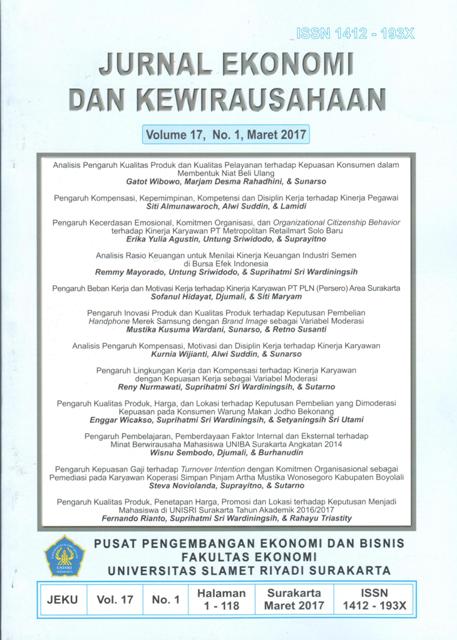PENGARUH KEPUASAN GAJI TERHADAP TURNOVER INTENTION DENGAN KOMITMEN ORGANISASIONAL SEBAGAI PEMEDIASI PADA KARYAWAN KOPERASI SIMPAN PINJAM ARTHA MUSTIKA WONOSEGORO KABUPATEN BOYOLALI
Abstract
The turnover rate of employees at Credit Unions Artha Mustika Wonosegoro
Boyolali district is currently very high. The purpose of this study was to analyze the
significance of the effect on pay satisfaction and organizational commitment on
employee turnover intentions. Analyze the significance of the influence of organizational
commitment on employee turnover intentions. Analyze significant effect on turnover
intentions salary satisfaction with organizational commitment as a mediating variable.
This study uses survey method, the type of data used quantitative and qualitative data,
the data source used primary data and secondary data. Population and sample in this
study were all employees of Credit Unions Artha Mustika Wonosegoro Boyolali totaling
32 employees, so this study is a census study. Data collection methods are used:
questionnaires and documentation. Data analysis technique used to test the validity,
reliability test, classic assumption test, and path analysis. In conclusion, that there is a
significant impact salary satisfaction to organizational commitment. There is significant
influence pay satisfaction and organizational commitment to turnover intentions. The
results of the analysis we concluded that the mediating effect of organizational
commitment mediates not pay satisfaction influence on turnover intentions.
Keywords: pay satisfaction, organizational commitment, turnover intentions.
Downloads
Published
Issue
Section
License
Authors who publish this journal agree to the following terms:
- Authors retain copyright and grant the journal right of first publication with the work simultaneously licensed under a Creative Commons Attribution License that allows others to share the work with an acknowledgement of the work's authorship and initial publication in this journal.
- Authors can separately make additional contractual arrangements for non-exclusive distribution published by the journal (e.g., publish it in a book), with an acknowledgement of its initial publication in this journal.
- Authors are allowed and encouraged to send their work via online (e.g., in the institutional repositories or their website) after published by the journal.









